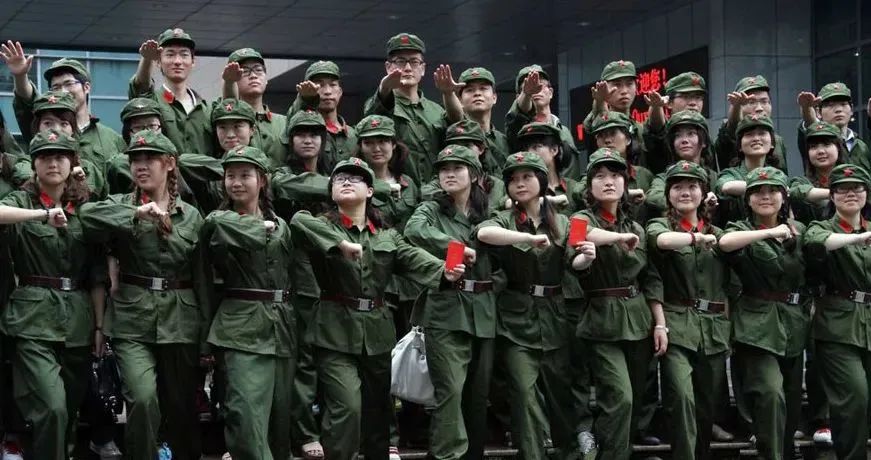Editor’s note: The following is a short essay of interest seen on Chinese social media. As often happens online, the author’s name is unknown. The writer George Santayana famously said, “Those who cannot remember the past are condemned to repeat it.” For the sake of the future of the Chinese people, one hopes at least here Santayana was wrong.
Source: WeChat

An online survey on the Cultural Revolution conducted by Fenghuang.com’s history channel had astonishing findings. As many as 58% of netizens support the Cultural Revolution, and only 42% oppose it. A movement that had been completely repudiated and swept into the dustbin of history, and which brought great disaster to the Chinese nation, is now supported by more than half of respondents. This must make people reflect.
In this regard, I think Mr. Cao Jingxing has a good idea: we can set up a Cultural Revolution camp, and give priority admittance to those who support the actual Cultural Revolution. Older supporters can be locked in the cowshed, and younger ones can go to the countryside, taking turns engaging in struggle sessions, with these once a week being violent. When distributing food coupons, coupons specifically for meat, oil coupons, cloth coupons, and soap coupons, only samples can be seen, and private Internet access and mobile phones are absolutely not allowed. The experience should last at least half a year, and if this is insufficient their stay should be extended.
For those of you who have not experienced the actual Cultural Revolution, would you like to go back and try it? But if you were to go back, some of you might not survive even one day.
Imagine that you accidentally do some small thing, and immediately there are ideological “activists” all around to report to gain political brownie points, without caring if you live or die. Could you stand it, especially when these whistleblowers are those closest to you? It is important to know that during the Cultural Revolution, informers were ubiquitous. Sons would swing copper-headed belts at their fathers, and the husband might be a Judas who betrayed his wife. Anyone who has experienced the Cultural Revolution knows that it was an era when even one’s near and dear were not allowed to tell the truth, as it was very common for fathers and sons, husbands and wives, brothers and sisters to betray each other. In such an environment, even naive primary- and middle-school students became very scheming.
Imagine having to be careful about everything you say. Because in some places at that time, some people carried small notebooks all day long, and if someone said something wrong, such a person would take out the small notebook as soon as the speaker turned his face, and write it down, what did so-and-so say on a certain day. If others were present, simply clearly remember what was said, and then go to inform.
Imagine being imprisoned in one place for life, unable to leave. Farmers, you just farm at home for the rest of your life. Except for serving as a soldier or taking an exam, you could not go someplace else to work. Could you bear it?
Imagine that your birth entirely determines your fate. If you are lucky enough to be born into a poor peasant family, there will be fewer troubles for you. But if you were born into a family of a former landlord or rich peasant, then you will spend your whole life as the target of criticism. Could you bear it?
Imagine that as a good young urban person you go to the countryside to join the movement. Be careful that your plan is not only for a short time. Some return to the city after several years, and some can never go back. In order to return to the city, many beautiful female educated youths are forced by village cadres to sell themselves to obtain a ticket home. Could you accept this happening to you?
If you can bear all this, then you might as well suggest to set aside an entire county and fill it with everything from the Cultural Revolution. You can to your heart’s content post big-character posters, everyone can expose each other, and you can parade in the streets, criticize, blackmail, dispose of, attack violently and kick the ribs of old men. And if course, the main food will be corn-bread salted radish.
Why are people still nostalgic for such a catastrophe?
For those who miss the Cultural Revolution, an important argument is “There was not much corruption during the Cultural Revolution, and indeed the Cultural Revolution was the most fundamental form of anti-corruption.”
Yet during the Cultural Revolution, was there really “not much corruption”? As everyone knows, the first peak period of “going through the back door” to get what you want and “running to the ends of the earth to seek relationships” in China was during the Cultural Revolution. At that time, even if the children of senior cadres went to the countryside, they managed to return by serving as soldiers, recruiting workers, being promoted to the level of cadres, or becoming college students by using the identities of laborer, peasant, and soldier. Those educated youths without the right background or relationships, in contrast, remained in the countryside, forced to accept “re-education by poor and lower-middle-class peasants.” Among the 18 million educated youths, the children of ordinary people without official backgrounds had to pay a greater price.

(A post-80s’ wedding, held entirely in accordance with the style during the Cultural Revolution)
Although the Cultural Revolution was a catastrophe in which both officials and ordinary people paid a huge price, a majority of the latter today mistakenly believe that it was a movement that “benefited people like them.” As for the large group of young people born after the Cultural Revolution, because they have not experienced its pain personally, their minds have been “formatted,” and they are more inclined to believe that it was a “democratic movement” that suppressed corrupt, wealthy officials and their offspring and was conducive to maintaining social fairness and justice.
If we really placed today’s young people back into the Cultural Revolution society, I’m afraid they wouldn’t be able to survive even a day under conditions like that. But why do more and more young people celebrate the Cultural Revolution that once caused the country’s economy and people’s livelihoods to almost collapse? The reason is simple: they don’t know what happened then.
And more people remember the Cultural Revolution fondly because they have illusions about it. This is especially so for some young people who are ignorant of the painful lessons that are not so far in the past, and in the face of corruption and injustice today, and frustration that they are powerless to change it, they engage in wishful thinking about using methods that entail neither democracy nor the rule of law, and other unconventional means, to govern society.
Perhaps most of those who miss the Cultural Revolution and the past do not actually miss these things themselves, but miss the Cultural Revolution and the past that represent their own childhood, as well as the many stories from their youth buried deep in their memories. For example, the educated youths miss the time when they went to the countryside. It cannot be said that going to the countryside is a beautiful experience. For the youth if that era the reason for remembered beauty is not the act of going to the countryside, but that that era represents the many memories related merely to youth.
Today, what can carry us is “the last train of modern civilization,” and we can only move forward and not backward! Behind lies only the abyss. Once you fall into it you will be lost forever; there will be no coming back.
Where do we go from here? The answer lies entirely in the thoughts of the Chinese people.
【转载请加上出处和链接:https://yibaochina.com/?p=250080】
(This piece was translated from Yibao Chinese. If republished, please be sure to add the source and link before the text when reprinting: https://www.yibao.net/2023/04/29/seen-online-the-results-of-an-online-survey-about-the-cultural-revolution-do-not-give-one-hope/ )
The views of the author do not necessarily represent those of this journal.




















